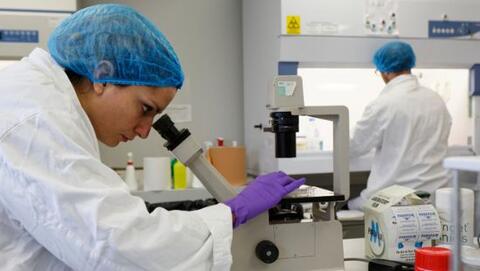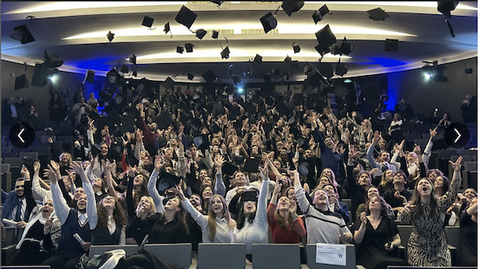
Master's degree in Molecular and Cellular Biology (BMC)
The aim of the Master's degree in Molecular and Cellular Biology (BMC) is to provide students with a very high level of training in molecular and cellular biology in the broadest sense, and then to specialize in these or other fields such as biochemistry, developmental biology, stem cells, biotechnology, genetics, immunology, microbiology, bioinformatics or biophysics. From September 2025, marine organisms will be proposed as a new model for the study of some of these disciplines.
The Master's program offers 12 tracks, seven of which are specific to the program and five shared with other programs, including two new courses: Artificial Intelligence and Data Analysis, and Chemistry-Biology Interface (molecular engineering of living systems).
News
The "Evaluation and Surveys" department of Sorbonne University's Faculty of Science and Engineering has just published the exhaustive results of the latest professional integration survey for the BMC Master's program 30 months after graduation.
Unlike the exhaustive figures we make available to the general public, the InserSup figures published on MonMaster concern only :
- salaried employment in France,
- graduate students of French nationality,
- students aged under 30 at the time of graduation,
- students who have never interrupted their studies for more than two years between obtaining their baccalauréat and the master's degree or professional license for which they are being surveyed.
For more information, see the FSI page.
Applications for M1 were open from February 25 to March 24, 2025.
Applications for M2 and the International M1 “From fundamental molecular biosciences to biotherapies” are open from March 27 to June 12 2025!
- To find out the dates and the right application platforms to use for specific BMC programs for 2025/2026, consult this page.
-
For additional information, please consult the dedicated page on the Sorbonne University website.
From September 2025, the Master BMC will offer new courses:
- the M2 “Artificial Intelligence and Data Analysis” track, shared with the BIP department.
- the integrated M1&M2 track “Chemistry-Biology interface_molecular engineering of living organisms”, shared with the Chemistry department.
- the “Neuro-Immunology” theme shared by the Immunology track and the Neurosciences department
- the “Marine Biology: from molecule to organism” theme of the “Cell Biology, Development, Cancer: from stem cells to organisms” track
The Master BMC graduates of the class of 2024 received their diplomas at a festive ceremony
Congratulations to them !

Find the pdf of BMC presentation (in French) given for the Sorbonne University Masters Open 2025
BMC degree courses
The first year (M1) of the BMC major is organised into seven pathways (see diagram below in French):
- M1-Core curriculum
- M1-Bioinformatics and Modelling (BIM) course
- M1-Chemistry-Biology interface (molecular engineering of living organisms) from September 2025
- M1-International course: From Fundamental Molecular Biosciences to Biotherapies (F2MB2)
- M1-International course: Interface Biology Physics (iBP)
- M1-Innovation in Biotechnology apprenticeship training
- M1-Thematic Quality, Environment and Health Safety (QUESS) apprenticeship training
In the second year (M2), 12 different courses are offered, 8 of which share the common M1 course:
-
Artificial Intelligence and Data Analysis shared with the BIP department
- Biochemistry & molecular biology
- Cell biology, developmental biology & stem cell biology: this pathway offers three subjects taught in English.
- Biotechnologies: this course offers an apprenticeship program.
- Genetics and epigenetics: this pathway offers a subject taught in English.
- Immunology: this pathway offers four subjects taught in English.
- Microbiology: this course offers an apprenticeship program.
- Biological systems and physical concepts (shared with 'Physics and Applications')
The M1 core curriculum is structured in a way that enables each student to orientate themself progressively during the first year of the Master's programme. Students, in consultation with the teaching staff, draw up their own teaching contracts, choosing their UEs, to prepare themselves for at least two M2 courses.
The From fundamental molecular biosciences to biotherapies (international track), Bioinformatics and Modelling (track shared with the Computer Science department) and Chemistry-Biology interface (molecular engineering of living organisms, track shared with the Chemistry department) are structured as integrated M1&M2 pathways accessible in M1.
The Preparatory course for the external SV-STU agrégation, accessible in M2, is shared with the Biodiversity, Ecology and Evolution (BEE) and Earth and Planetary Sciences, Environment (STePE) master's programmes.
In partnership with the CFA des Sciences, two BMC tracks offer work-linked apprenticeships, which place students directly in the world of business from the first year of their Master's degree:
- The 'Innovation in biotechnology' program of the Biotechnology track
- The 'Quality-Environment-Sanitary Safety (QUESS)' program of the Microbiology track
The BMC Master's degree offers:
TWO INTERNATIONAL TRACKS AVAILABLE :
- The international “From fundamental molecular biosciences to biotherapies” track, organized over the two years M1/M2 in collaboration with partner universities, allowing students to follow a complete teaching program in English in the fields of biotherapies.
- The international "Interface-Biology-Physics (iBP)" program, which allows the M1 year to be followed by a complete teaching program in English at the interface between physics and biology.
Applications: from 27th March to 12th June 2025 on the Sorbonne University application platform, ecandidat (English version available)
SEVEN THEMES ACCESSIBLE IN M2 :
a. Cell biology, Development, Stem cells track :
- Cell biology
- Developmental Biology
- Stem Cell Biology
For more information, please visit: https://sciences.sorbonne-universite.fr/formation/offre-de-formation/masters/master-biologie-moleculaire-et-cellulaire-bmc/m2-parcours-1
b. Immunology track:
- Integrative and Systemic Immunology
- Immunology and Immunopathology
- Translational Immunology and Biotherapies
- Immunology, Genetics and Oncology
For more information, please visit: https://sciences.sorbonne-universite.fr/formation/offre-de-formation/masters/master-biologie-moleculaire-et-cellulaire-bmc/m2-immunology
c. Genetics and Epigenetics track:
- Immunology, Genetics and Oncology
For more information, please visit: https://sciences.sorbonne-universite.fr/formation/offre-de-formation/masters/master-biologie-moleculaire-et-cellulaire-bmc/m2-parcours
Applications: from 27th March to 12th June 2025 on the Sorbonne University application platform, ecandidat.
Access to the platform is possible through:
- The ecandidat link (English version available)
- The Sorbonne University application web page:
https://sciences.sorbonne-universite.fr/formation/candidatures-et-inscriptions/master
MOBILITY
Incoming : The Master's program welcomes international students by exchange programs between institutions or independently. To know the courses taught in English, it is here
Outgoing : For students interested in an international experience, in addition to the exchange programs between institutions, it is possible to carry out the M1 and/or M2 internships abroad.
Financial support for outgoing mobility is available. These grants are managed by the International Mobility Office of the Faculty of Science and Engineering.
The Master's program also welcomes international students for incoming mobility, independently of the exchange programs between institutions.
For more information on international mobility, please visit https://sciences.sorbonne-universite.fr/formation/international or contact the BMC mobility coordinator Clément Carré.
Every year, the BMC master's program receives numerous internship proposals in France for M1 and M2 students in the fields covered by the BMC major. The BMC master's program also encourages international internships (financial aid for internships abroad is available on this page: https://sciences.sorbonne-universite.fr/international-1/partir-linternational/mobilite-etudiante/partir-en-stage).
If you would like to host one of our M1 or M2 students for an internship in your laboratory, please fill in the online internship proposal form. The teaching staff in charge of monitoring internships will check that your proposal is in line with the courses on offer.
- M1 internship: https://lime3-app2.sorbonne-universite.fr/index.php/496673
- M2 internship: https://lime3-app2.sorbonne-universite.fr/index.php/992767
Subject-specific skills
- Comprehensive knowledge of biology in general and specialist knowledge in several areas corresponding to the subject taught within the major,
- Master the basic techniques and equipment used in molecular biology, biochemistry and cell biology, which are essential for all areas of biology,
- Know how to implement an experimental approach from its conception to the validation of the scientific results obtained,
- Know how to manage bibliographic resources (databases, online scientific journals, etc.) and master the scientific literature related to the biological field concerned when setting up or carrying out a scientific project,
- Ability to synthesise data from both the literature and experimentally acquired data,
- Critical analysis of scientific results.
Cross-disciplinary skills
- Use your knowledge and creativity to pose and solve a scientific problem,
- Ability to learn, both theoretically and experimentally, and to adapt to new information,
- Analyse and summarise different types of documents,
- Organise personal work and know how to work independently or as part of a team,
- Carry out a project, take the initiative required for its successful completion,
- Communicate results (oral presentation, poster presentation, written report) and defend a project in front of opponents,
- Assess the quality and relevance of a scientific work or approach, whether or not you are the creator,
- Proficiency in scientific English (B2 level certification).
- The range of skills acquired will train students to work in research fields or research and development departments, both in the public sector and private companies. They will also be able to prepare a doctorate leading to recruitment as a researcher, teacher-researcher, engineer, etc. in the public sector (Universities, CNRS, INSERM, CEA, INRA, etc.) or in equivalent positions in the private sector, the public sector (universities, CNRS, INSERM, CEA, INRA, etc.) or equivalent positions in the private sector.
Job opportunities
Students graduating from the BMC Master's programme can work as managers in the fields of research or in research and development departments, both in the public service and private sector companies. They can also go on to prepare a doctorate leading to recruitment as a researcher, teacher-researcher, engineer, etc., in the public service (Universities, CNRS, INSERM, CEA, INRA, etc.) or in equivalent positions in the private sector, the public sector (universities, CNRS, INSERM, CEA, INRA, etc.) or equivalent positions in the private sector. As this is a more professionally-oriented course, some of the subject areas are directly linked to companies, particularly those associated with ESTBB (partners in the biotechnology, pharmaceutical and cosmetology masters courses, etc.), making it easier to integrate directly into the world of work.
The aim of the Association pour la Vie Etudiante du master BMC (AvéBMC) is to raise the profile of the BMC master's degree, strengthen the spirit of the class, and help and develop a network between the current student community and former students on the course.
Contact us
The BMC Master’s Department
Campus Pierre et Marie Curie
Bâtiment C, 1er étage, pièce 106
Sorbonne Université
Département de formation
Biologie moléculaire et cellulaire
Case courrier 147
4 place Jussieu
75252 Paris cedex 05
The BMC Master’s Department team
The BMC master department team
Director
Samia Salhi
Deputy Director
Sandrine Castella
Director of Studies
Marta Garcia
Administrative Manager of the Training Department
Maryna Khodjamirian
M2 course leaders
See corresponding pages
M1 & M2 teaching managers
Heads of course evaluation
Agnès Audibert
Sandrine Castella
Heads of professional integration
Tounsia Ait-Slimane
Aline Stedman
Head of International Mobility
Clément Carré
Heads of M1 placements (in France and abroad)
Nathalie Dostatni
Ariane Ramaekers
Correspondent for the Student Health and Disability Service (SHSE)
Marta Garcia
Student Life Correspondent:
Marta Garcia
Head of gap year
Sandrine Castella
